英语服务类职业模块unit-1 - 副本
中职英语基础模块Unit 1
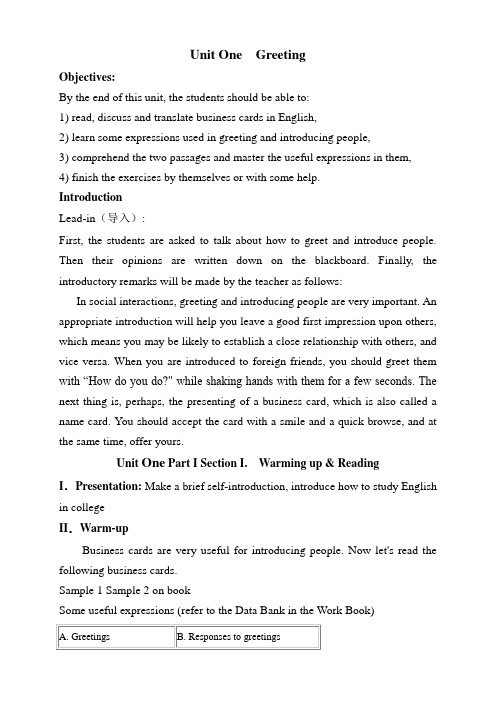
Unit One GreetingObjectives:By the end of this unit, the students should be able to:1) read, discuss and translate business cards in English,2) learn some expressions used in greeting and introducing people,3) comprehend the two passages and master the useful expressions in them,4) finish the exercises by themselves or with some help.IntroductionLead-in(导入):First, the students are asked to talk about how to greet and introduce people. Then their opinions are written down on the blackboard. Finally, the introductory remarks will be made by the teacher as follows:In social interactions, greeting and introducing people are very important. An appropriate introduction will help you leave a good first impression upon others, which means you may be likely to establish a close relationship with others, and vice versa. When you are introduced to foreign friends, you should greet them with “How do you do?" while shaking hands with them for a few seconds. The next thing is, perhaps, the presenting of a business card, which is also called a name card. You should accept the card with a smile and a quick browse, and at the same time, offer yours.Unit One Part I Section I. Warming up & Reading I.Presentation: Make a brief self-introduction, introduce how to study English in collegeII.Warm-upBusiness cards are very useful for introducing people. Now let's read the following business cards.Sample 1 Sample 2 on bookSome useful expressions (refer to the Data Bank in the Work Book)III.Read the passageAsk the students to skim the passage.IV.Analyze the passage, and explain the language points and difficult sentences.(In this step, some related information will be provided for the students.) Formation of Common English NamesA common English name is usually composed of two or three parts: the first name is also called forename. If the person is a Christian, his first name will be given at his baptism, so it is also called the given name or the Christian name. Middle name is the second given name. When written, middle name is often shortened to the initial letter. Surname is often the father’s family name, so it is also called family name or last name. For example: Anne Louise Strong, George W. Bush.Ask the students to skim the passage and answer the questions.①. What does an informal greeting really mean to Americans?②. Why don’t most Americans like using titles in introductions?③. What do your American friends want to show when they address you with your first name?④. Why do Americans ask you some personal questions?Analyze the passage, and explain the language points and difficult sentences(1) Explanation of Difficult Sentences①(Title) The Way American GreetAnalysis: In this title, "in which" is omitted after The Way.“in… way” means (to do something) by means of a certain method. Translation: 美国人的致意方式Example: I think the way she studies is worth studying.②(Para. 1) Speaking of …time, I’ve got to run.Analysis: "Speaking of" is a present participle clause used as an adverbial of cause/time. It means “when it comes to time, I’m reminded of …”Translation: 说到时间,我得赶紧跑了。
中职英语基础模块一学案答案.docx
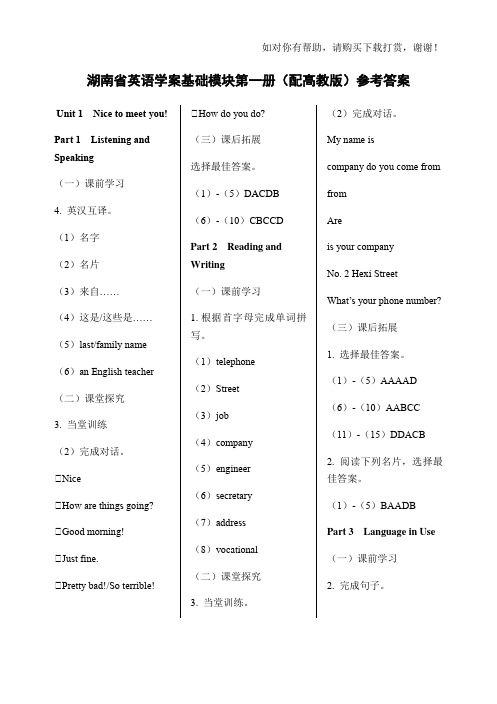
湖南省英语学案基础模块第一册(配高教版)参考答案Unit 1 Nice to meet you!Part 1 Listening and Speaking(一)课前学习4. 英汉互译。
(1)名字(2)名片(3)来自……(4)这是/这些是……(5)last/family name (6)an English teacher (二)课堂探究3. 当堂训练(2)完成对话。
①Nice②How are things going?③Good morning!④Just fine.⑤Pretty bad!/So terrible!⑥How do you do?(三)课后拓展选择最佳答案。
(1)-(5)DACDB(6)-(10)CBCCDPart 2 Reading andWriting(一)课前学习1.根据首字母完成单词拼写。
(1)telephone(2)Street(3)job(4)company(5)engineer(6)secretary(7)address(8)vocational(二)课堂探究3. 当堂训练。
(2)完成对话。
My name iscompany do you come fromfromAreis your companyNo. 2 Hexi StreetWhat’s your phone number?(三)课后拓展1. 选择最佳答案。
(1)-(5)AAAAD(6)-(10)AABCC(11)-(15)DDACB2. 阅读下列名片,选择最佳答案。
(1)-(5)BAADBPart 3 Language in Use(一)课前学习2. 完成句子。
(1)am a student(2)My father is anengineer.(3)Is(4)doctor; patients(5)Are they teachers?No, they are doctors. (二)课堂探究3. 当堂训练。
中职英语 基础模块1 Unit 1 Personal and Family Life
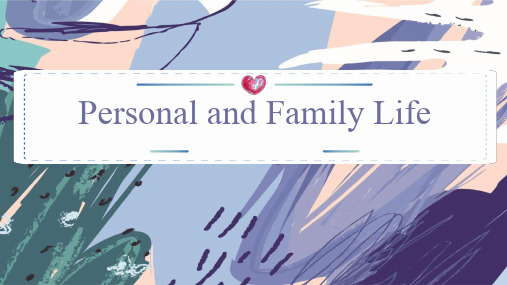
重点详解
1. family name given name Liu Xingting is a flight attendant.
Xinting is her given name. Xu Ming is a firefighter. Xu is his family name.
单词卡片 middle school student
younger sister
twin sisters especially
community
n.初中生 n.妹妹
n.孪生姐妹 adv.尤其是
n.社区
单词卡片 cook
Chongyang Festival handmade
family name delivery person
我的一名消防员,我的妻子是一名教师。
(2)He wants to work as a teacher in Western China. 他想在中国西部当一名教师。
重点详解
4.manage.v动词 manager.n 名词
英译汉: 1.He manages a department. 2.He is a manager.
n.厨师 重阳节 adj.手工的 n.姓 n.送货员
单词卡片 given name flight attendent firefighter vocational ancestor
n.名 n.空乘人员 n. 消防员 adj.职业的
n.祖先
单词卡片 address formal
situation
as for name after
little
三、选择题。
英语服务类职业模块unit 1
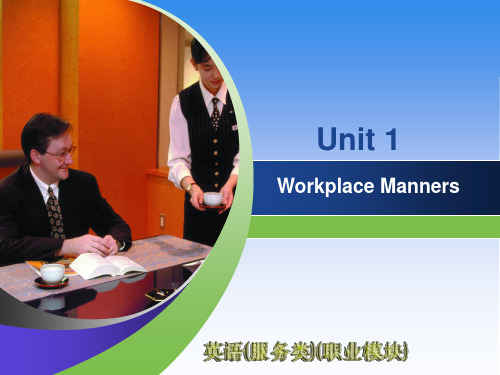
1
2
□coffee □water □Cola
□magazine □newspaper □headphones
3
□pillow □medicine □blanket
script
英语(英语服服务务类类职)业模(块职unit业1 模块)
Dialogue 2
UNIT 1 Workplace Manners
Unit 1
Workplace Manners
英语服务类职业模块unit 1
Contents
Unit Goals Lead-in
Listening & Speaking Reading & Writing Language in Use Unit Task Extended Activities Fun Time
you leave your phone number, I’ll get in touch with you. (The salesgirl takes a pen to write.) Customer: OK. Thank you for your help. Salesgirl: You are welcome.
UNIT 1 Workplace Manners
A
B
C
D
( 3) script
( 1)
(4 )
(2 )
英语(英语服服务务类类职)业模(块职unit业1 模块)
Dialogue 1
UNIT 1 Workplace Manners
What Can I Do for You? (A salesgirl is serving a customer in a shop politely.) Salesgirl: Good morning, madam. What can I do for you? Customer: Yes, I’m looking for a dress in size 36. Salesgirl: How about this blue one? Customer: The color is nice, but I prefer silver. Salesgirl: Sorry, madam, we don’t have the right size in silver. But if
新职业英语职业综合英语Unit 1
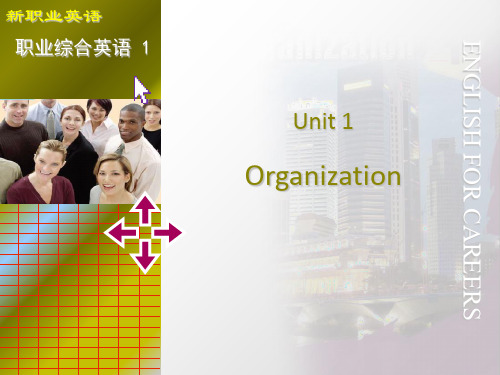
职业综合
英语 1 Unit 1 Organization
Company introduction
Bavarian Motor Works (BMW) is an independent German automobile manufacturer founded in 1916. BMW is a worldwide manufacturer of high-performance and luxury automobiles and motorcycles.
职业综合
英语 1 Unit 1 Organization
ReadTAe-i3xnt g A
Page and his partner Sergey Brin set up their company on September 7, 1998 and registered the the following week. The search engine quickly grew in popularity and in 2000 Google began to sell advertising on their website. After a few years of growth fueled by eager investors, Google went public. Many Google employees became instant millionaires.
Wal-Mart Stores, Inc., founded in 1962, is an American public corporation that runs a chain of large, discount department stores. It is the world’s largest public corporation by revenue, according to the “2008 Fortune Global 500”.
《英语》(职业模块 工科类)unit 1

New Words
Phrases
Notes
bug
program favor fix
appreciate down guess
n.
n. n. v. v. adj. v.
故障,毛病 程序
帮助;恩惠 修理;校正;校准
感激 停机;停止运行
认为;猜想 To be continued
Windows XP
major in do sb. a favor
1
Acer Incorporated
Warm-up
Here are some computer company’s logos. Please write the computer’s names under the corresponding pictures.p
Here are some computer company’s logos. Please write the computer’s names under the corresponding pictures.
英语
职业模块 工科类
Unit One Computer Science
Highlights
Computer Science
Warm Up Listening and Speaking
Reading Just for Fun
Section A
Warm Up
Warm-up
Here are some computer company’s logos. Please write the computer’s names under the corresponding pictures.
Warm-up
职高英语拓展模块(1-6单元)题库
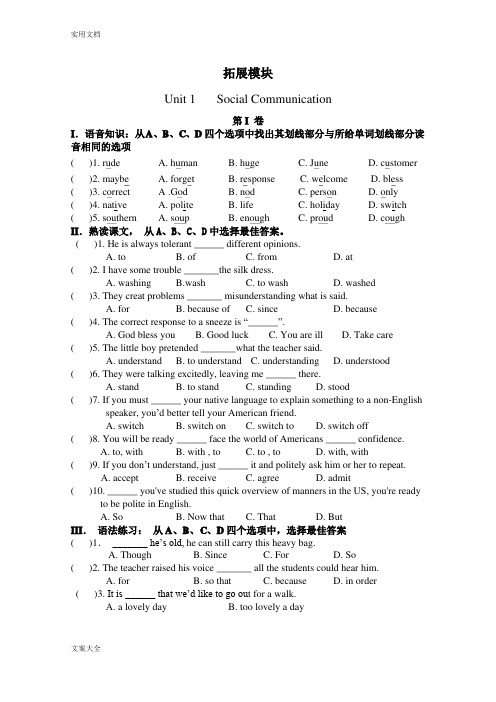
拓展模块Unit 1Social Communication第I卷I.语音知识:从A、B、C、D四个选项中找出其划线部分与所给单词划线部分读音相同的选项()1. rude A. human B. huge C. June D. customer()2. maybe A. forget B. response C. welcome D. bless ()3. correct A .God B. nod C. person D. only()4. native A. polite B. life C. holiday D. switch ()5. southern A. soup B. enough C. proud D. cough II.熟读课文,从A、B、C、D中选择最佳答案。
()1. He is always tolerant ______ different opinions.A. toB. ofC. fromD. at()2. I have some trouble _______the silk dress.A. washingB.washC. to washD. washed()3. They creat problems _______ misunderstanding what is said.A. forB. because ofC. sinceD. because()4. The correct response to a sneeze is“______”.A. God bless youB. Good luckC. You are illD. Take care()5. The little boy pretended _______what the teacher said.A. understandB. to understandC. understandingD. understood()6. They were talking excitedly, leaving me ______ there.A. standB. to standC. standingD. stood()7. If you must ______ your native language to explain something to a non-English speaker, you’d better tell your American friend.A. switchB. switch onC. switch toD. switch off()8. You will be ready ______ face the world of Americans ______ confidence.A. to, withB. with , toC. to , toD. with, with()9. If you don’t understand, just ______ it and politely ask him or her to repeat.A. acceptB. receiveC. agreeD. admit()10. ______ you've studied this quick overview of manners in the US, you're ready to be polite in English.A. SoB. Now thatC. ThatD. ButIII.语法练习:从A、B、C、D四个选项中,选择最佳答案()1._______ he’s old, he can still carry this heavy bag.A. ThoughB. SinceC. ForD. So()2. The teacher raised his voice _______ all the students could hear him.A. forB. so thatC. becauseD. in order()3.It is ______ that we’d like to go ou t for a walk.A. a lovely dayB. too lovely a dayC. so lovely a dayD. such lovely a day()4. Mary had ______ much work to do that she stayed at her office all day.A. suchB. soC. tooD. very()5. _____ she goes, there are crowds of people waiting to see her.A. WhereverB. HoweverC. WhicheverD. Whoever()6. You must speak louder ______ you can be heard by all.A. so thatB. in order toC. becauseD. such that()7. ______ well you can drive, you must drive carefully.A. So long asB. In order thatC. No matter howD. The moment()8. If we work with a strong will, we can overcome any difficulty, ____great it is.A. whatB. howC. whateverD. however()9._______ he’s very young, _______ he knows several languages.A. Though, butB. Because, soC. Though, /D. Because, / ()10. _____ I suggest, he always disagrees.A. HoweverB. WhateverC. WhicheverD. WhoeverIV.完形填空:Last summer, my wife Jane and I went to visit the town where we both grew up. We 1there since we were married ten years ago.2,we went to the neighborhood where my wife spent her childhood.It hadn’t changed very much. The house3she was born was still there, but it was now a different color. The same neighbors still lived next door. They were very glad to 4Jane, and asked us to come in and have a cup of coffee. We learned about all the neighbors, old and new. Jane had a very good5. As fast as one question was answered, she would ask the next. “What happened6the Dunbars who used to have the little yellow house on the corner?”,“Who bought the old Johnson place in the next block?”,“Do Fred and Martha still live down the street?”,“What about Miss Burton who7in that extremely big house around the corner?”Then we went to see the neighborhood where I grew up. What a8! It was all changed. All the old houses I remembered were9and in their place were some very modern ones. I didn’t know any of the people who10there.() 1.A. hadn’t been B. wasn’t C. haven’t been D. didn’t be() 2. A. At the very beginning B. First C. Firstly D. For the first time() 3. A. that B. / C. where C. which() 4. A. find B. know C. meet D. see() 5.A. time B. ask C. home D. question() 6. A. with B. to C. for D. about() 7. A. live alone B. lives lonely C. lived alone D. stayed lonely() 8. A. disappoint B. disappointing C. disappointed D. disappointment () 9.A. gone B. ruins C. there D. the same() 10. A. worked B. stayed C. studied D. livedV.阅读理解AEducation for Japanese children is free for the first nine years and all children must go to school six years of primary schooling and three years of secondary schooling. In the primary and secondary schools,about99.9per cent of school-age children are present. School usually begins at 8 o'clock in the morning and ends at 3 o'clock in the afternoon on weekdays and at noon on Saturdays. The school begins in April and ends in March. There is a summer holiday in August and a winter holiday during the New Year season.After nine years of schooling,students can enter the three-year high school by passing an examination and by paying a small charge each year.After high school, students can go on to study at various types of colleges, usually for four years. There are also two-year junior colleges.() 1. The passage mainly discusses about ______.A.colleges in JapanB.free education in Japancation in Jap anD.school time in Japan() 2. How many days have the Japanese students to go to school every week?A.Not known.B.Four and half days.C.Five days.D.Five and a half days.() 3. If a student wants to go to a high school in Japan, he or she must ______.A.pay a large amount of moneyB.study at primary and secondary school for 9 yearsC.take part in (参加) the exam and pay a little moneyD.pass the exam and pay a little money() 4. What is mentioned in the passage?A.Types of colleges.B.Perio ds for different schoolings.C.The teaching staff (教职员工).D.The number of children attending schools.() 5. According to the passage what is true?A.Almost all Japa nese children have school education.B.Japanese schools have three vacationsC.Japanese children have freedom to choose schools.D.Weekdays are from Monday to Sunday.BFrom a plane we can see the fields, cities, mountains or seas below. If we go intospace, we see more and more of the earth. People and man-made satellites have been sent out into space to look at the earth carefully and people have learnt more about the earth in the last few years.The sea looks very beautiful when the sun is shining on it.But it can be very terrible when there is a strong wind.The sea is very big. It nearly covers three quarters of the earth. The sea is also very deep in some places. There is one place and at that place the sea is about 11 kilometers deep. The highest mountain in the world is about9 kilometers high.If that mountain was put into the sea at that place, there would be still 2 kilometers of water above it!In most parts of the sea, there are many kinds of fishes and plants. Some live near the top of the sea. Others live deep down. There are also a lot of small living things, and lots of fishes live by eating them.The sea can be very cold.When people go down,the sea becomes colder and colder.Only some men can go down into the deep sea.But,in1970,five women scientists (科学家) lived in the deep sea for fourteen days.()6. This passage is_________.A. a short storyB. for science readingC. a piece of newsD. a report()7. The sea covers about _______of the earth.A One third B. One fourthC. Two quartersD. Three fourths()8. _______are not mentioned (提及) in this passage.A. IslandsB. FishesC. PlantsD. Living things()9. Which of the following is NOT true?A. The sea is usually beautiful when the sun is shining.B. The sea is always very terrible when the wind blows hard.C. The highest mountain is in the deepest place of the sea.D. The deeper the people go into the sea, the colder they will feel.()10. The last sentence “But, in 1970, five women scientists live d in the deep sea for fourteen days.” means that________.A. women wanted to live in the deep sea for a long timeB. women could go deeper into the sea than menC. women liked living in the deep sea better than menD. women could do the same work as men第II卷I.单词拼写:根据下列句子及所给汉语注释,在横线上写出单词的正确形式1. No matter what we said, he______(假装)that he knew nothing about it.2. The ________(观众) enjoyed every minute of the performance.3. The naughty boy ________(承认)that did it with his father’s help.4. Sorry,I can’t __________(解释)why I am engaged in that job.5. The best way to practice English is to talk with a _________(本国的) speaker. II.词形变换:用括号内单词的适当形式填空1.I became________(annoy)when I felt that he pretended to understand what Imeant.2.He _____(polite)asked the man to give a correct response.3.Work hard and you’ll have _________ (confident ) to face the challenge of life.4.The boy felt _____(lose)when he heard something he didn’t understand.5.She created some problems because of _______(misunderstand) what her boss said. III.词义搭配:从B栏中选出A栏单词的正确解释A B() 1.tolerant A. man, woman or child, not an animal() 2. rude B. say or do something again() 3. native C. sudden burst of air from the nose and mouth() 4. repeat D. accepting what one doesn’t like() 5. human E. belonging to or being the place of one’s birth() 6. conversation F. fit, right() 7. admit G. informal talk() 8. sneeze H. agree to the truth of usually something bad() 9. suitable I. an answer or an action done in answer() 10. response J. not politeIV.补全对话。
外研社2023英语职业模块工科类学生用书升级版课件Unit 1课件 Extended Activit
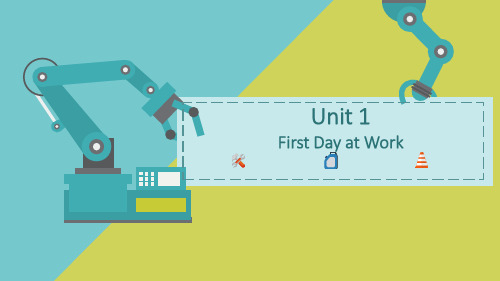
Not appropriate. Tom should examine the CNC machine the minute he arrives at the factory.
What do these craftsmen have in common? First, they all have worked hard and devoted themselves to their jobs. Second, they have enquiring minds and are curious about their work. Third, they have never stopped pursuing excellence. We should learn from these great craftsmen, and make our own contributions to China’s development.
More words I know in this part:
3. My Progress Check
Expressions I have learnt in this part:
□ electrical equipment
□ CNC operator
□ so as to
□ go well
Great! Now I know _____ useful expressions.
- 1、下载文档前请自行甄别文档内容的完整性,平台不提供额外的编辑、内容补充、找答案等附加服务。
- 2、"仅部分预览"的文档,不可在线预览部分如存在完整性等问题,可反馈申请退款(可完整预览的文档不适用该条件!)。
- 3、如文档侵犯您的权益,请联系客服反馈,我们会尽快为您处理(人工客服工作时间:9:00-18:30)。
A store Waiters
receptioni attendants cashier and
st works work on a works in waitresses
in a h_o_t_e_l _p_la_ne
a s_h_o__p_. work in a
英语(服务类)(职业模块) _re_s_t_a_u_ra_n_t_
What should you say in the following situations?
1.The customer is not satisfied with your service.
_I _a_p_o_lo_g_iz_e__/I_’m__s_o_rr_y_. ____________
2.You don’t know anything about the product the customer wants to buy.
英语(服务类)(职业模块)
Role Play
UNIT 1 Workplace Manners
Practice the dialogue by using the pictures below
and see if you can say more.
sick, medicine thirsty, tea
UNIT 1 Workplace Manners
Spell out the missing words. The first letter of
the words is already given.
1.Betty is a friendly
r_ec_ e_ _p _t i_ _on_ i_ s_ t
□ wear beautiful clothes □ greet customers with a smile □ be friendly to customers □ follow customers everywhere □ make phone calls at any time □ be patient a英n语d(服k务e类)e(p职业s模m块)iling
Unit 1 Workplace Manners
Unit 1
Judy
Lead-in
UNIT 1 Workplace Manners
Do you know their workplace? Match.
restaurant shop
hospital plane
office hotel
A hotel Flight
Lead-in
UNIT 1 Workplace Manners
Do you know their workplace? Match.
restaurant hospital
office
shop
plane
hotel
A nurse An office Chefs
A
works in a clerk
work in a salesgir
(A flight attendant is serving a passenger.) Flight attendant: May I help you, sir? Passenger: I’d like something to drink. Flight attendant: Certainly. We have tea, coffee, fruit juice, Cola and water. Passenger: I’d like to have a cup of coffee. Flight attendant: Yes, sir. I’ll bring it for you. Passenger: By the way, can I have a pillow and a blanket? Flight attendant: Of course. Passenger: Thanks.
Th_a_t’_s_a_g_o_o_d_q_u_e_s_tio_n_._L_e_t_m_e__fin_d__ou_t_f_or_y_o_u_._
3.The customer has made a mistake and complains about your service.
I_th_i_n_k_t_h_e_re__h_a_s_b_e_e_n_a__m_i_s_u_n_d_e_rs_t_an_d_i_n_g_. 英语(服务类)(职业模块)
Short-answer Questions
UNIT 1 Workplace Manners
What should you say in the following
situations?
4.The item the customer wants to buy is sold out.
C_a_n__I _g_e_t _yo_u_r__n_am__e_a_n_d__n_u_m_b_e_r_a_n_d_ call you when it comes in?
英语(服务类)(职业模块)
5.You are just closing the shop and a
customer comes in.
Is__th_e_r_e_s_o_m__e_th_in_g__I_c_a_n_q_u_i_c_kl_y_h_e_l_p_y_o_u__ with now?
英语(服务类)(职业模块)
Part I. Spell
Reading
UNIT 1 Workplace Manners
Avoid Negative Customer Service Phrases
Some sayings retailers should avoid:
1. I don’t know.
2. I can’t do it any better.
in a small hotel.
2.Ann is 3.Tom is 4.Susan a happy making a always
c_h_ef_ c_om_ _pl_a_i s_er_v_e_s and she Leabharlann n_t_ at customers
always the front with a smiles. desk. smile.
Words and Expressions
W o r d s a n d E x p r e s s i o n s 1
Read after me!
英语(服务类)(职业模块)
Pre-reading Activity UNIT 1 Workplace Manners
Have a discussion with your partner and tick the right workplace manners.
3. We’re closed.
4. It’s over there.
5. We’re out of that.
6. I’m new here.
7. Hold on.
英8.语Y(o服u务’r类e)w(r职o业n模g块. )
Short-answer Questions
UNIT 1 Workplace Manners
h_o_s_p_i_ta_l. works in r_e_s_ta_u_r_a_n_t_. works in
ano_ff_i_c_e_.
a _s_h_o_p.
英语(服务类)(职业模块)
Dialogue
UNIT 1 Workplace Manners
May I Have a Cup of Coffee, Please?
A: Can I help you, Madam? B: I feel a little ______. Can I have
some ______? A: Yes, sir. Here you are. B: Thanks. 英语(服务类)(职业模块)
UNIT 1 Workplace Manners
